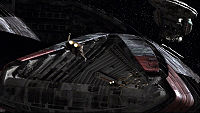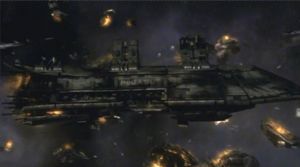Flight pod: Difference between revisions
More languages
More actions
No edit summary |
|||
| Line 19: | Line 19: | ||
From comparing various graphics, it can be seen that the length of one of ''Galactica'' 's flight pods is around 660 metres long, 60 metres tall and 46 metres wide. Most of the internal space is taken up by the pod's enormous [[landing bay]], giving it similar dimensions.{{fact}} | From comparing various graphics, it can be seen that the length of one of ''Galactica'' 's flight pods is around 660 metres long, 60 metres tall and 46 metres wide. Most of the internal space is taken up by the pod's enormous [[landing bay]], giving it similar dimensions.{{fact}} | ||
Raptors are advised to fully exit the flight pod and move some distance from the battlestar before activating their FTLs to avoid causing damage from the spatial disruption caused by the jump ([[Someone to Watch Over Me]]). ''Galactica'''s starboard flight pod was ruptured by several Raptors jumping after being moved into the bay ([[Daybreak, Part 3]]). | Raptors are advised to fully exit the flight pod and move some distance from the battlestar before activating their FTLs to avoid causing damage from the spatial disruption caused by the jump ([[Someone to Watch Over Me]]). ''Galactica'''s starboard flight pod was ruptured by several Raptors jumping after being moved into the bay ([[Daybreak, Part 3]]). It should be noted that the old battlestar was suffering from endemic metal fatigue in her hull by this point- rendering her particularly vulnerable to damage. it is not known how risky a FTL jump within a flight pod would be to a full-strength, top-of -the-line battlestar. | ||
''Galactica'' typically retracts the flight pods in order to perform an FTL jump, but it is still possible to jump with them extended. However | ''Galactica'' typically retracts the flight pods in order to perform an FTL jump, but it is still possible to jump with them extended. However when exiting a jump after suffering massive damage, an already-structurally weakened ''Galactica'' suffers a series of hull collapses and distortions, and several Vipers are thrown clear of the flight pods. This suggests that jumping with the flight pods out, though possible, might increase the strain on the ship's structure and cause a hazard to any vessel in the landing bay ([[Daybreak, Part 2]]). As above, note that ''Galactica's'' superstructure was already fundamentaly weak at this point- it is not known what damage jumping with the pods out would cause to a top-of-the-line ship of ''Galactica's'' class. | ||
== ''Pegasus'' == | == ''Pegasus'' == | ||
Revision as of 00:16, 27 March 2009
Also known simply as "pods", the flight pods contain the landing bays within the top and the hangar deck below, along with the launch tubes within the bottom half, adjacent to the hangar deck. Normally these two pods are extended so that the landing bays are open to space, but are typically retracted in order to perform an FTL jump with a battlestar class such as Galactica's.
The forward end of the landing bay also serves as a launch area for Raptors and shuttles. The landing bay is large enough to accept a variety of other Colonial vessels, at least as large as "heavy" passenger ships such as Colonial Heavy 798. Docking collars are located throughout the upper sections of the landing bay in order to provide a pressurized connection between a docked vessel and the battlestar.[1] The flight pods also have docking ports to dock with larger ships or stations.
Compartments within a flight pod can be sealed off frame by frame and vented to space to kill fires and prevent possible complete decompression and structural buckling. This occurred to the port flight pod after it was struck with a Cylon kiloton nuclear missile and was subjected to internal fires that threatened to ignite the ship fuel lines and destroy the ship. The use of the busy port hangar deck as a morgue would be rather morbid, so Commander Adama orders Galen Tyrol to set up a temporary morgue be in "hangar bay B" after the loss of 85 crewmembers from the strike (Miniseries). Since the port hangar deck (bay) is very busy with retrieving Vipers, and we see Captain Kelly with the bodies in what appears otherwise as an empty hangar deck, it is likely the unused hangar deck of the starboard flight pod.
Galactica

Galactica, as with other battlestars, has one flight pod on each side of the ship. The port flight pod was the only flight pod on Galactica currently in use at the time of the Cylon Attack. The starboard flight pod's landing bay was converted into a pressurized museum of artifacts of the first Cylon War, including with a gift shop in the former launch bay. Crewman Socinus complains of the problems in keeping the landing bay's external windows sealed from leaks at the start of the Miniseries.
The starboard landing bay remains closed off from space until a Cylon Heavy Raider later crashes through one of the windows, depressurizing the landing bay (Scattered). After the Battle of New Caprica, the starboard flight pod appears to have been returned to partial working order as Lee Adama announces that his Raptor approaches the starboard landing bay in "A Measure of Salvation". However, this could be explained by special circumstances, as the boarding team is supposed to undergo quarantine procedures and might thus land in a more isolated place. The second explanation appears more likely, because in late Season 3 episodes the window covering the rear opening of the pod is still visible.
Since the escape from New Caprica, Galactica's flight pods have been put to use increasingly in other roles than just housing Vipers and Raptors. The hangar deck is used as the site of a refugee camp (Torn), as the scene of a sanctioned boxing tournament known as "the dance" (Unfinished Business), as a temporary shelter for the civilian population of the Fleet while navigating a radiation-dense star cluster (The Passage) and a full-time bar has been set up on an unused stretch of the hangar deck (Taking a Break From All Your Worries). This most likely all happened in the relatively unused starboard flight pod.
From comparing various graphics, it can be seen that the length of one of Galactica 's flight pods is around 660 metres long, 60 metres tall and 46 metres wide. Most of the internal space is taken up by the pod's enormous landing bay, giving it similar dimensions.[citation needed]
Raptors are advised to fully exit the flight pod and move some distance from the battlestar before activating their FTLs to avoid causing damage from the spatial disruption caused by the jump (Someone to Watch Over Me). Galactica's starboard flight pod was ruptured by several Raptors jumping after being moved into the bay (Daybreak, Part 3). It should be noted that the old battlestar was suffering from endemic metal fatigue in her hull by this point- rendering her particularly vulnerable to damage. it is not known how risky a FTL jump within a flight pod would be to a full-strength, top-of -the-line battlestar.
Galactica typically retracts the flight pods in order to perform an FTL jump, but it is still possible to jump with them extended. However when exiting a jump after suffering massive damage, an already-structurally weakened Galactica suffers a series of hull collapses and distortions, and several Vipers are thrown clear of the flight pods. This suggests that jumping with the flight pods out, though possible, might increase the strain on the ship's structure and cause a hazard to any vessel in the landing bay (Daybreak, Part 2). As above, note that Galactica's superstructure was already fundamentaly weak at this point- it is not known what damage jumping with the pods out would cause to a top-of-the-line ship of Galactica's class.
Pegasus

The Mercury class battlestar Pegasus also has flight pods, but they differ greatly from Galactica's in that these larger pods are fixed and not retracted before a jump, with each pod transversely split into two landing bays to allow four distinct landing areas for fighters.
Several of Pegasus ' main guns are instead located along the flight pods instead of on the dorsal hull (like Galactica 's are).
The lower landing bay is placed upside down in relation to the upper bay, with ships also landing "upside down" relative to the battlestar main interior. Since Galactica's landing bays don't seem to use artificial gravity, this could also be the case with Pegasus. The internal arrangement of the hangar decks is unknown, but some mechanism could exist to flip Vipers during transport to the internal hangars.
During the Battle of New Caprica, the abandoned and unmanned Pegasus collides with and destroys one of the four basestars that attack Galactica. One of its flight pods breaks off the destroyed battlestar and tumbles away to collide with and destroy yet another basestar (Exodus, Part II).
One section of the upper flight pod is open to the side, allowing spacecraft to land vertically. Vehicles, such as bulldozers, tows and fork lifts, are available to recover landed or damaged spacecraft within the landing bay (Razor).
See Also
References
- ↑ Colonial Heavy 798 is seen landing within Galactica's flight pod in the Miniseries, where a docking ring is shown approaching the ship. As it left Caprica, a similar docking ring is shown detaching from 798 as the ship lifts off. This has a logical counterpart to the JetWay retractable tunnels at airports on the real-world Earth, and would be reasonable given that civilian passengers would expect to walk to and from the ship without spacesuits or in hazardous conditions.
